End Plastics
THE GLOBAL PLASTIC TREATY IN GENEVA: A Rallying Cry, Not an Epitaph
August 21, 2025

AMINA TAARIQ-SIDIBE
MANAGER OF END PLASTICS INITIATIVES
In Geneva this August, the world gathered once again to finalize the long-awaited Global Plastics Treaty. The stakes could not have been higher: plastic pollution is choking the environment and wildlife, pretty much poisoning us all, and fueling the climate crisis. INC-5.2, a resumed session of the fifth round of negotiations, was supposed to be the moment countries bridged divides and delivered an ambitious agreement.
From the moment I landed in Geneva on August 5th, 2025, I was filled with excitement. My first day was a whirlwind. It started with exploring the art installations and then going straight into the Opening Plenary. That evening, the Swiss government hosted a reception bringing together different stakeholders, including delegates, scientists, and civil society. It was a great reminder that the global community is in this together, no matter our role.
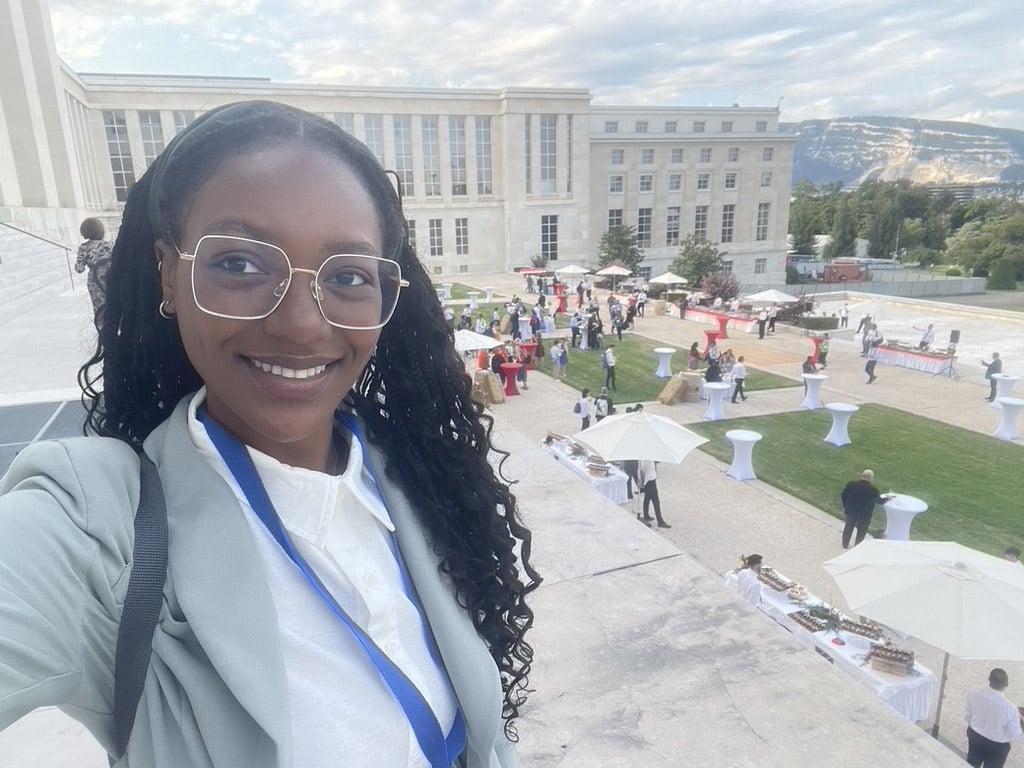
Aminah on the UN Cour d’honneur in Geneva for INC 5.2
The days that followed were a testament to the dedication of activists coping with the frustrating realities of bureaucracy and multilateralism. August 6th found me energized, participating in coalition morning meetings and plunging into Contact Group 1. There, amidst discussions on plastic products and chemicals of concern, the limitations of the UN’s consensus model became clear, and the statements from some nations were concerning. Yet, the energy of collaboration persisted as I moved to Contact Group 3, focused on finance and capacity building.
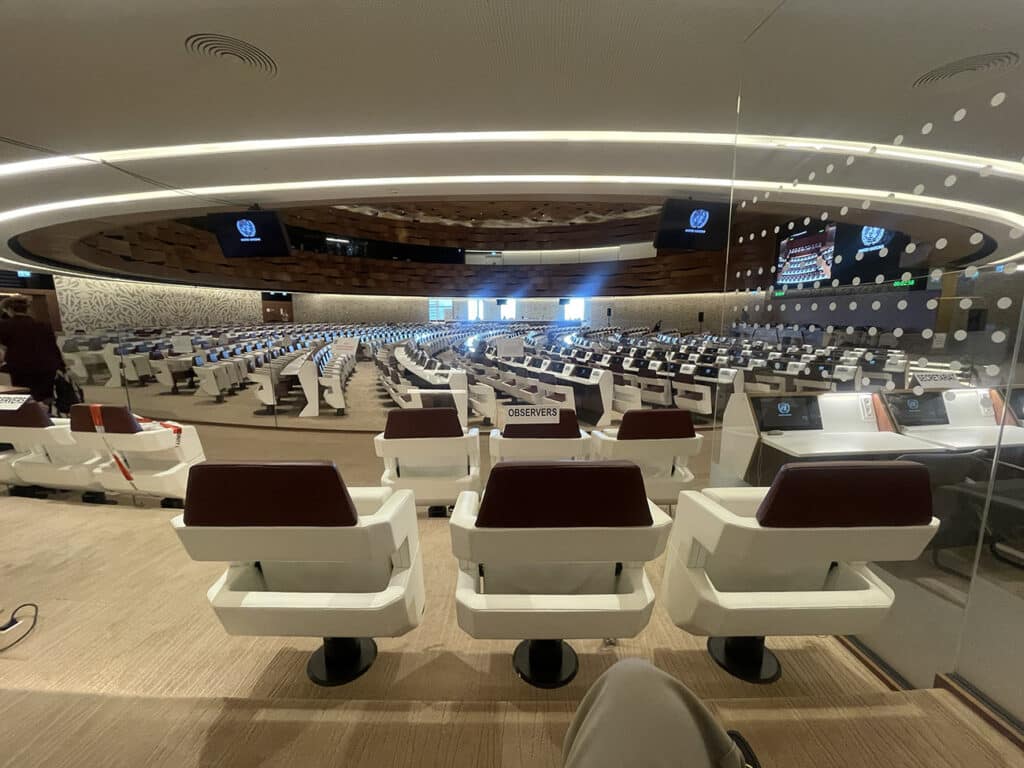
Contact Group room at Palais de Nation
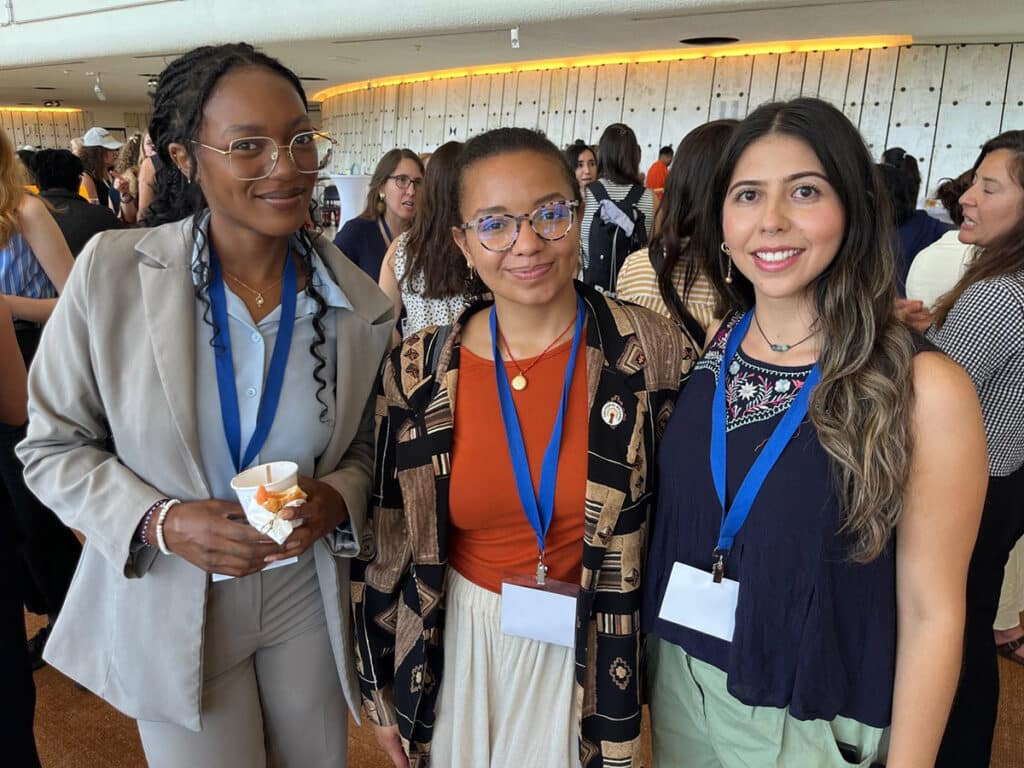
Aminah with civil society folks at the Women’s Delegate Lunch
On August 7th, optimism prevailed. We had coalition calls every morning, and Contact Groups consumed most of the day. The influence of the Contact Group chairs on the conversation was undeniable, which highlighted for me the human element of these complex negotiations. A bright spot was the Women’s Delegate Lunch where I made some great connections. Later, I attended CIEL’s press conference on fossil fuel and chemical lobbyists, which underscored the other forces at play.
Luckily, my time in Geneva wasn’t just about the Contact Groups. August 8th was particularly impactful, starting with a special meeting for People of African Descent, addressing the disproportionate environmental impacts on the global Black diaspora.
This was followed by a powerful press conference for Affected Groups Aligned for Justice, where Indigenous Peoples, waste pickers, and unionized workers demanded a binding treaty that centered on justice and rights. These moments, which were filled with real emotion and unwavering conviction, solidified my commitment to the movement.
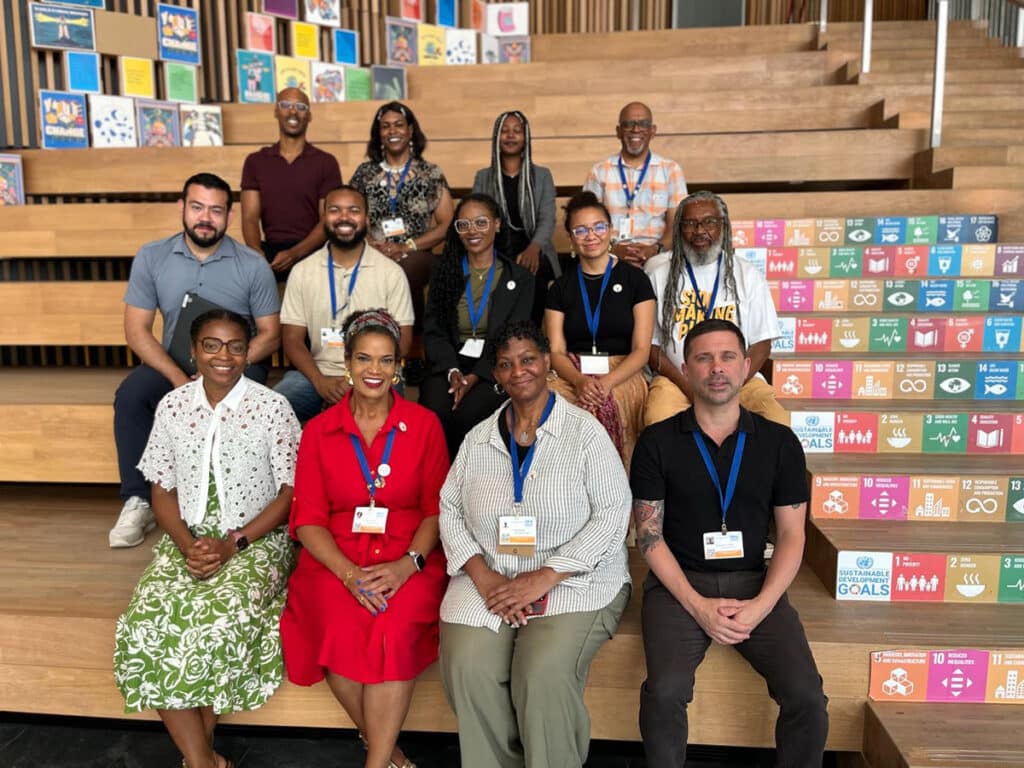
Aminah with frontline community representatives and members the Office of the UN High Commissioner for Human Rights
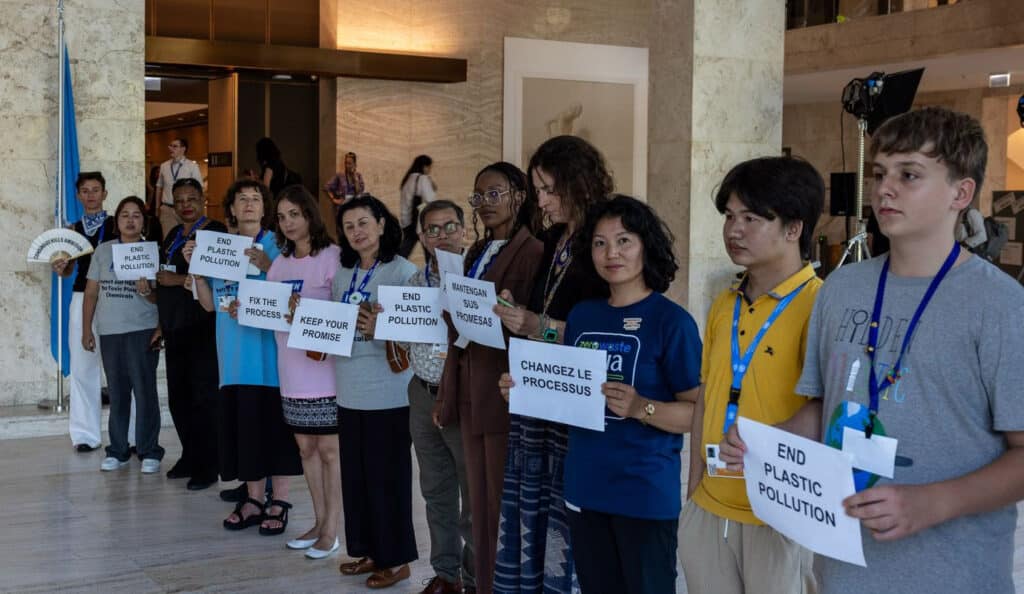
Observer demonstration
Resistance to a bad treaty continued to build on August 9th with a coalition demonstration, where we demanded a stronger treaty before the second Plenary.
There was also a deeply moving observance of the International Day of the World’s Indigenous Peoples, which reminded me of the rich cultural heritage and profound connection that these people have to the Earth and which must be protected.
On August 10th, negotiations took a much needed break, and I spent the day recharging with a picnic in the park and exploring the city. Then, on August 11th, I had the incredible honor of speaking at “The Stories We Carry” press conference. Sharing my perspective on the impact of plastic pollution on people of African descent and our role in the treaty was a profound experience for me.
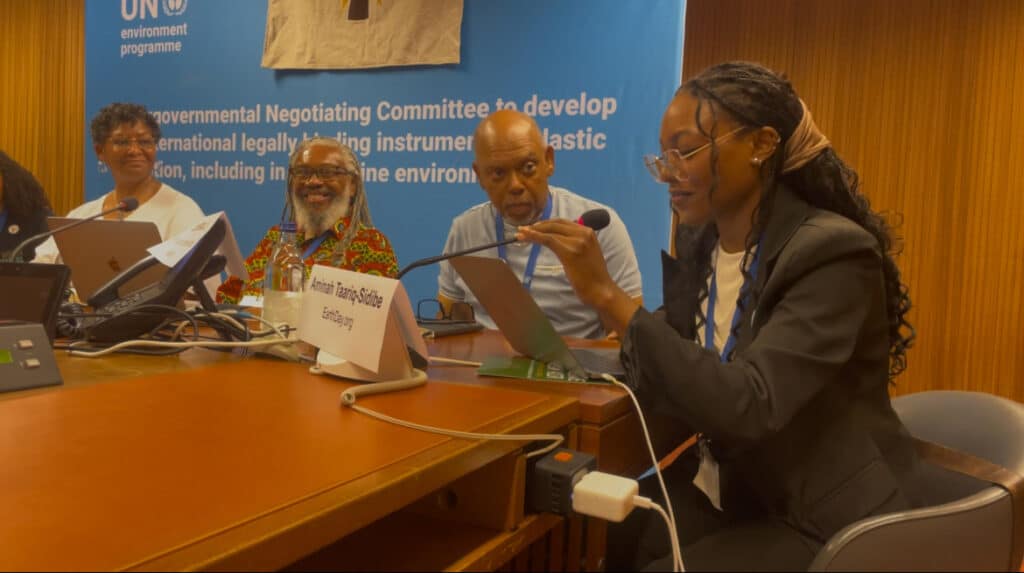
Aminah at The Stories We Carry Press Conference, August 11, 2025
My final sessions in Geneva, Contact Group 1 on health, brought my journey to a close, leaving me with a mix of exhaustion and a sense of determination. My time at INC-5.2 was more than just meetings; it was a testament to the power of collective action. I was able to connect with incredible people while on the ground, and it gave me the motivation to keep working hard.
The Reality of Negotiations
Nevertheless, what was meant to deliver a treaty ended with talks collapsing. INC-5.2 adjourned without consensus, without a roadmap forward, and without the commitments scientists and communities say are essential to curb the plastic crisis.
From the beginning, INC-5.2 was filled with procedural wrangling. Hours that should have been spent on topics like production cuts, toxic chemicals, and financing were swallowed by debates over rules of procedure. The Like-Minded Countries (LMC), a coalition of countries like Saudi Arabia, Iran, and Russia that advocates for downstream waste management and recycling, refused to support global measures and did not want a global regulatory approach. Saudi Arabia, the U.S, and other petro-states also pressed for consensus-only decision-making, a tactic that caused paralysis. Because if every country has to agree to move forward on a proposal, it means that it only takes one or two countries to block that progress. So what is the point?
Behind the scenes, the fossil fuel and petrochemical lobbies were working hard. At least 234 fossil fuel and chemical industry lobbyists (up from 221 identified at INC-5.1) registered to participate in INC-5.2. Lobbyists worked to water down the treaty text and shift conversations away from plastic production. Their influence was felt in the Chair’s draft text proposal, which, instead of binding measures, leaned on voluntary actions and left out critical issues like plastic production cuts, health protections, climate connections, and human rights safeguards. Leaving out health is particularly concerning because without explicit health provisions, countries are not required to assess and manage risk across the full plastics life cycle which can misdirect prevention and just transition.Transparency was another problem. Civil society groups, who traveled from across the globe to represent frontline communities, were often excluded from key rooms.
Spoilers vs Champions
But the story of INC-5.2 is not just about failure. It is also about resilience, solidarity, and the clear refusal by countries and civil society to accept a treaty too weak to matter.
If petro-states were spoilers, others emerged as champions. High-Achieving Coalition (HAC) countries, including the European Union, Pacific Small Island Developing States (SIDS), Colombia, Peru, Rwanda, and Panama made it clear they still support a Global Plastics Treaty, but will not sign a bad one. HACs rejected the Chair’s weak text, sending a signal that they would rather walk away than endorse a treaty that legitimizes inaction. Additionally, they joined civil society in calling for majority-vote decision-making when consensus fails.
The highs also came from the unwavering resolve of civil society. Despite being sidelined, organizations converged their voices to speak out and have their reality considered during the negotiations. There were creative demonstrations and expert insight being presented during the week. I believe the consistent organizing and statements from civil society had a huge impact on ensuring an effective treaty.
What Comes Next
History shows that global treaties are rarely easy. They are forged through struggle, setbacks, and persistence. The Paris Agreement followed years of failures and the Montreal Protocol came after fierce battles with industry. The plastics treaty will be no different.
INC-5.2 was a setback, yes. But it also made one thing clear: the world will not settle for a treaty that fails to address the root of the plastics crisis. Civil society, frontline communities, and ambitious governments have drawn a line in the sand.
Although INC-5.2 ended in disappointment, it also clarified what must happen next.
First, the process itself must change. Negotiations cannot continue under rules that allow one or two countries to veto progress while billions suffer the consequences. Majority voting mechanisms must be adopted when consensus fails, and civil society must be guaranteed meaningful access.
Second, ambition must be reasserted. Civil society and high-ambition countries are united in their demands:
- Binding cuts to plastic production.
- A global phase-out of toxic polymers and harmful chemicals.
- A just transition for workers and communities dependent on the plastics economy.
- Dedicated financing mechanisms, including a new fund to support low- and middle-income countries.
- Explicit protections for health, human rights, and the climate.
Third, governments must respond to public opinion. Surveys show that more than 80 percent of people worldwide support cuts to plastic production. Citizens understand the scale of the problem. Now leaders must act on that mandate rather than bowing to petrochemical lobbyists.
Finally, the failure of INC-5.2 must not be mistaken for the end of the treaty process. It is a pivotal moment, a warning shot that a weak treaty will not pass. The INC Chair has confirmed that the negotiations will resume in a future session (INC-5.3).The movement for a strong plastics treaty is global, organized, and resilient, and it is not going away.
To learn more visit our End Plastics page. Add your voice, demand action from your leaders, and stand with the global movement fighting for a future free from plastic pollution. The fight is still on to end plastic pollution.
This article is available for republishing on your website, newsletter, magazine, newspaper, or blog. The accompanying imagery is also cleared for use. Please ensure that the author’s name and their affiliation with EARTHDAY.ORG are credited. Kindly inform us if you republish so we can acknowledge, tag, or repost your content. You may notify us via email at [email protected] or [email protected]. Want more articles? Follow us on substack.